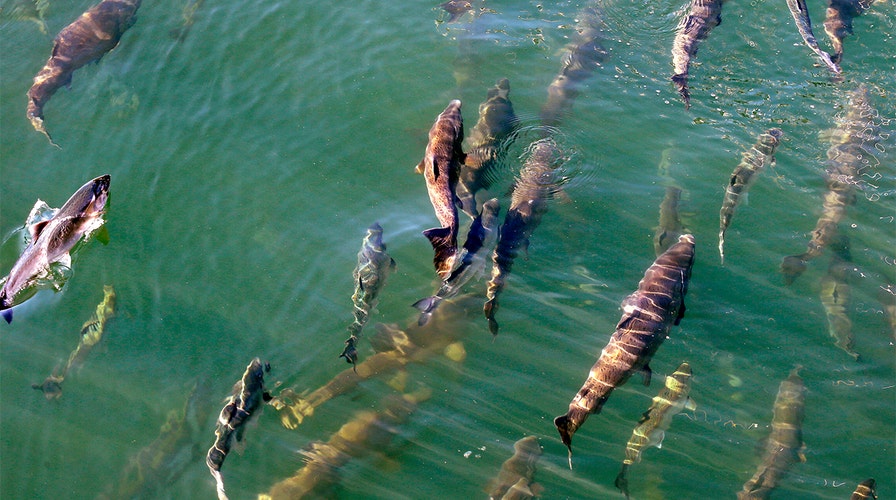Fox News Flash top headlines for Sept. 5
Fox News Flash top headlines for Sept. 5 are here. Check out what's clicking on Foxnews.com
Government scientists said Thursday they are monitoring a new ocean heat wave off the West Coast which could badly disrupt marine life.
Five years ago, an expansion of warm ocean water nicknamed "the Blob" by scientists disrupted the marine ecosystem off the West Coast. Now, a similar expanse of abnormally warm water positioned in the same area has threatened to do the same.
The 2014 heat wave saw temperatures spike seven degrees Fahrenheit above average. It led to poor returns on young salmon, more humpback whales becoming entangled in fishing gear as they swam closer to shore, the stranding of young sea lions on the California coast, and an algal bloom that shut down crabbing and clamming in the Pacific Ocean.
RARE, TWO-HEADED RATTLESNAKE FOUND IN NEW JERSEY 'PROBABLY WOULDN'T SURVIVE IN THE WILD'
This 2019 heat wave has already seen temperatures rise five degrees above normal.
“It’s on a trajectory to be as strong as the prior event," said National Oceanic and Atmospheric Administration (NOAA) research scientist Andrew Leising, who has developed a system for tracking and measuring heat waves.
FARMERS CONCERNED OVER HOW MANDATORY WATER CUTS FROM COLORADO RIVER WILL IMPACT AGRICULTURE
The warm expanse stretching from Alaska to California is the second most expansive marine heat wave in the last 40 years. Cold water welling up from the depths of the ocean has helped to hold off the warm expanse. But, due to forecasted coastal winds, the upwelling is likely to subdue in the autumn, allowing the heat wave to settle in. It could even move onshore and affect coastal areas, which appears to have already happened along the coast of Washington, according to NOAA.
NOAA fisheries are monitoring on the heat wave, named the "Northeast Pacific Marine Heat wave of 2019," with the goal of informing managers how the unusually warm conditions could affect their stocks.
CLICK HERE TO GET THE FOX NEWS APP
A marine heat wave is not necessarily a direct result of climate change. The causes could include a persistent low-pressure weather pattern that weakens the winds that otherwise mix and cool surface waters, according to NOAA research scientist Nathan Mantua. It's unclear what's causing the low-pressure pattern; it could be the earth's disorderly motion or it could be related to ocean warming or other effects of human-made climate change, Mantua said.
It's unclear whether this new heat wave will stick around long enough to cause major damage.
The Associated Press contributed to this report.

